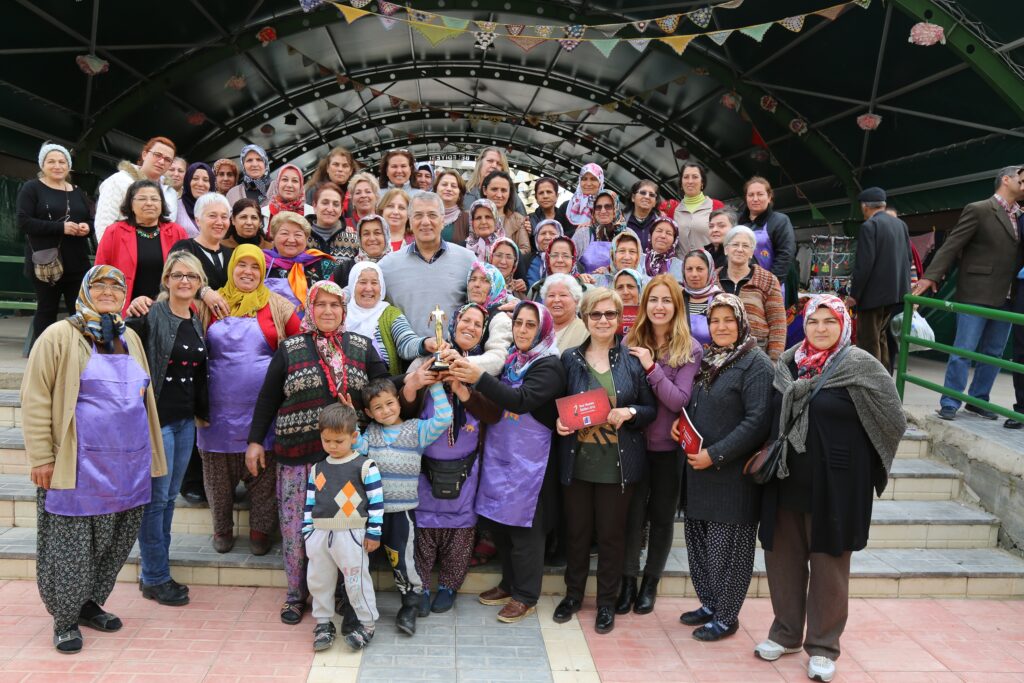Author: Jess Halliday
The Turkish city of Mezitli established its first markets exclusively for women producers in 2014. Six years later, some 650 women hold stalls at nine bi-weekly markets across the city, selling fruit and vegetables, olive oils, cakes, breads, desserts, teas, and all manner of other home-produced items. Hurrem Betul Levent Erdal, programme coordinator, spoke to Jess Halliday about the need for women-only markets, and the economic and social opportunities for participants.
Why were Women Producers’ Markets needed?
‘Our intention was to develop an economic structure for women. Turkish women are producers; producing is in their souls. But if they want to sell their produce, usually they have to create an enterprise, and that means legal paperwork and start-up costs.
‘Turkey has a tradition of weekly neighbourhood markets but it is not necessary for the stallholders to be producers. Most of them sell goods that they have purchased wholesale. There are also barriers to women’s participation in these markets, because they are controlled by men and because stallholders have to pay rent.’
Who can sell at the Women Producers’ Markets?
‘The Women Producers’ Markets are inclusive. To be eligible there are three conditions: you have to be a producer, be a woman, and be located in Mezitli. Stall-holders pay nothing – no rent, no electricity costs, nothing for security.
‘You can find a woman selling vegetables from a hillside neighbourhood far from the city centre, and at the next stall will be a lady selling tea who lives in a gated community, with a private pool and gardens. These two ladies are totally different. One of them only finished primary school, the other has a degree, is retired, and has children who are engineers or teachers.
‘Whenever we announce the opening of a new Women Producers Market, women can apply to have a stall. If there are more applications than stalls, we draw names out of a hat. Then, for the next opening, we add the the names of the women who did not get a stall last time.’
Has the programme encountered obstacles?
‘When we established the programme the men were not encouraging. After a while, a group of men from a neighbourhood market asked the Mayor for no more Women’s Producers Markets to be set up. They wanted a marketplace without any costs, too. But the Mayor and Assembly members did not back down.
‘One of the challenges in running the markets is how women present their products. They have no knowledge about marketing. It has also been hard to understand the need for competitive pricing with neighbourhood markets and supermarkets. They think their products are wonderful, and they want to sell them for higher prices.’
How are the markets supported by the municipality and other organisations?
‘The spaces where the markets take place and the infrastructure belong to the Municipality. For that kind of investment the Municipality needed a decision at the Assembly level. A small group of Assembly members and the rural manager from the cultural affairs unit led the process, and established the general rules. Each market has one coordinator, who is a woman and a staff member of the Municipality.
‘We also offer training and seminars, in partnership with NGOs. For example, members of the Mezitli Soroptimists Club share their skills. One, a bank manager, gave a seminar on money management. Other sessions have covered women’s rights, first aid, and young people and addiction. We have collaborated with a private hospital to offer a free health check to the ladies. And we organise ice-breaking activities, like a picnic in the hills or a trip to the cinema.’

What have been the impacts to date?
‘The Women Producers’ Markets have made a difference to women’s incomes and mobility. In the beginning the women used public transport to bring their goods to markets. Now, some of them have driving licences and cars. One woman has developed her own business as an
entrepreneur. We also see progress in visitor numbers. In the beginning the markets didn’t have many visitors. Now they are really crowded.
‘Some of the biggest impacts, though, are social. The women come from different cultures and living environments but after five years they are like a family. They help each other out and see each other as role models – for themselves and for their children. The children of the women from the hillside neighbourhoods would normally only meet people from a similar background. Now they can meet teachers or bankers.’
What are the latest developments in the programme?
‘The women asked for a breakfast area at the weekend markets, so we designed a space where customers can wash fruit and vegetables they have bought, and sit at picnic tables to eat börek (filled pastries) and drink tea and coffee. A few of the women producers are Syrian refugees. They have asked for a special selling day for Syrian women, which we are now preparing.
‘We are also trying to get the women to be more sustainable. We are creating an online system for them to buy sustainable materials for their stalls, like reusable cups and containers.’
More information:
www.milanurbanfoodpolicypact.org/2019/10/11/mezitli-mpa19
This article was originally published in Urban Agriculture Magazine 37: Gender in Urban Food Systems.
